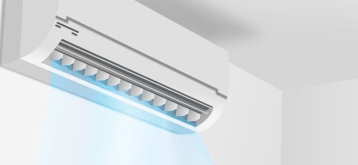Can Air Conditioning Make You Sick? What The Science Says
Advice
Air conditioning is now firmly embedded in modern society, and for good reason. It’s an incredible technology that has improved the comfort of millions of people, making soupy climates bearable across the world.
But can air conditioning make you sick? In this article, we explore how air conditioning can contribute to sickness, and what you can do to mitigate it and stay as healthy as possible.
Can air conditioning make you sick?
Air conditioning itself does not make you sick. However, it can circulate pollutants that may cause symptoms like a stuffy or runny nose, irritated skin, headache, fatigue, and breathing difficulties, as well as triggering allergies3. So the problem is the pollutants themselves, not the air conditioning system.
The pollutants in question are usually mould, bacteria, and other microorganisms that thrive in the moisture-heavy environment of an air conditioner. These pollutants can slowly build up in the system’s ducts, filters, cooling coils, drip pans, and other components, which is why it’s so important to regularly maintain and clean an air conditioner. If this is neglected, they contribute to something called “sick building syndrome”—a phenomenon where people experience acute health issues and discomfort when they spend too much time in badly ventilated building7.
Multiple studies have linked illnesses with air conditioning systems, and pollutants are the main reason why2. The other possible reason is that viruses may survive and reproduce more easily in cold dry air1, which are then spread through sneezing, coughing, and leaving them on surfaces. In addition to this, excessive cold has been shown to make your immune system less effective2, which is why you should always try to keep the AC temperature between the optimal range of 20 to 24°C.
Finally, no evidence has been found to suggest that air conditioners can directly spread viruses like COVID-19 or the common cold, by helping them to become “airborne.” Instead, these viruses may be able to proliferate more easily by the lower temperatures, and the lack of maintenance and cleaning of the AC system.
So what can you do to protect yourself from getting sick?
How to reduce your chances of getting sick from AC
1. Ensure the environment is properly ventilated
Split systems don’t have a way to ventilate the room, so it’s important to open up windows and let fresh air inside when the system isn’t being used. Ducted systems should have ventilation built in, but it’s good to do the same regardless. By properly ventilating the room, you’re discouraging the growth of bacteria and other pollutants, and improving the air quality.
2. Service the AC system annually
Every AC system should be serviced annually to ensure that it’s clean and in good working order. Professionals may scrub mould build-up away from key areas, and also clean the air filters as part of the service. This creates a much healthier environment.
3. Clean your air filters
If your system allows you to clean your air filters yourself (common for split systems), you should do so on a fortnightly basis. You can often slide the filters out of the system and give them a vacuuming, or even a scrub with soap and water if they need it. This will remove the pollutants from the filters and make the circulated air much cleaner.
4. Check your vents and ducts for mould
If you have a ducted system, you can check the vents to mould and dirt buildup, and scrub it away. Mould is nasty stuff. It can give you a runny nose, irritate your eyes or skin, and make you wheezy. If you have asthma, it can even trigger an asthma attack. So you’ll want to get rid of it ASAP.
To learn more, check out our guide on how to get rid of mould in air conditioning systems, and also our tips on cleaning your air conditioning ducts.
5. Vacuum and clean your home regularly
Split system air conditioners don’t have a fresh air intake, so they circulate the same air around the room. For this reason, it’s crucial to regularly vacuum your home and keep it as dust-free and mould-free as possible. This includes ceiling fans, blinds, and pretty much every surface that can collect dust.
Ducted systems do have a fresh air intake, but they can still blow dust around the room, so the same logic applies here—keep your home nice and clean.
6. Maintain the right temperature
The “right” temperature depends on your age and what you’re doing at the time. But generally, the optimum temperature for health is between 20 to 24°C. When you’re sleeping, the best temperature is believed to be 18°C, but this is likely to change depending on your personal preferences.
7. Point the fan upwards
If you’re getting directly blasted with cold air, this may make your immune system less effective, and can also give you dry skin or eyes. We recommend pointing the fan upwards or away from you, to stay in good health.
8. Drink plenty of water
A study by the US Army found that cold, dry air contributes to dehydration4, which can make you lightheaded and weak, and compromise your immune system. In addition to this, cold temperatures can also trigger something called cold-induced diuresis5, which makes you pee more and also requires you to drink more water to compensate (it isn’t clear exactly how cold you need to be for this effect to kick in).
9. Go outside
Being constantly cooped up inside usually leads to less moving around, less sunlight, poorer posture, a weaker immune system, and many more negative effects. It’s important to get outside once in a while, to exert your muscles a little bit, breathe in some fresh air6, and escape from any pollutants that may have built up in your home.
Can air conditioning make you sick—summary
Mould, bacteria, and other microorganisms can build up in your home and easily make you sick. That’s why it’s important to keep your air conditioner serviced and clean, and your home dust and dirt-free. Let’s be honest—in the sweltering heat of summer, you aren’t likely to turn the air conditioner off, so the best thing you can do is keep things nice and clean to reduce your chances of illness.
References
- Ellen F. Foxman, James A. Storer, Megan E. Fitzgerald, Bethany R. Wasik, Lin Hou, Hongyu Zhao, Paul E. Turner, Anna Marie Pyle, and Akiko Iwasakia, From the Cover: Temperature-dependent innate defense against the common cold virus limits viral replication at warm temperature in mouse airway cells, PMC
- Chompunuch Boonarkart, Ornpreya Suptawiwat, Kittima Sakorn, Pilaipan Puthavathana, Prasert Auewarakul, Exposure to cold impairs interferon-induced antiviral defense, Arch Virol
- Mark J Mendell, Commentary: Air conditioning as a risk for increased use of health services | International Journal of Epidemiology, Oxford Academic
- Scott Montain, Matthew Ely, William Santee, Karl Friedl, (PDF) Water Requirements and Soldier Hydration, Borden Institute
- 2017, What is Cold Diuresis, Arkansas Urology
- Damon Frank, 2020, How to Cope with the Negative Health Impacts of Staying Indoors, Walkin Lab
- 1991, Indoor Air Facts No. 4 (revised) Sick Building Syndrome, United States Environmental Protection Agency
Suggested Articles

Can Good Air Conditioning Help You…
Struggling to get a good night’s sleep? Your air conditioner might just be the secret weapon you…
Read More
How to Store Cords: Safe and…
Messy cords aren’t just frustrating — they can also be unsafe. Tangled extension leads, power cords and chargers…
Read More
The Benefits of LED Lighting: Why…
The Benefits of LED Lighting: Why You Should Make the Switch When it comes to lighting your home or business,…
Read More
